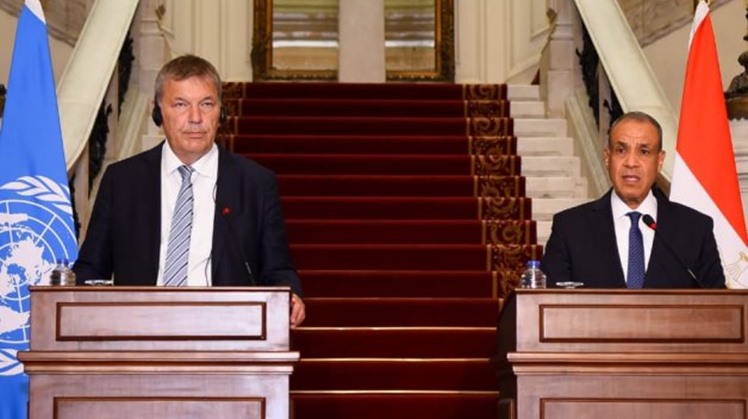CAIRO – 6 September 2025: Egypt firmly stressed that the Rafah border crossing with the Gaza Strip will never be used to displace Palestinians from their land, rejecting Israeli expansionist policies in the besieged enclave.
"The Rafah crossing is a crossing for individuals entering the Gaza Strip and for the entry of medical and humanitarian aid. It will not be a crossing for the displacement of Palestinians from their homeland. This is a firm position that will not change," said Egypt's Foreign Minister Badr Abdelatty during a joint press conference in Cairo on Saturday with Philippe Lazzarini, Commissioner-General of the UN Relief and Works Agency for Palestine Refugees (UNRWA).
Abdelatty added that Israeli occupation forces control five other crossings with Gaza and stated: "If they want to challenge the international community in displacing Palestinians, they have other crossings and must bear this moral and humanitarian crime. We reiterate that the Rafah crossing will not be a crossing for the displacement of Palestinians from their homeland."
His remarks came in response to a statement from Israeli Prime Minister Benjamin Netanyahu’s office, which claimed that "the Egyptian Foreign Ministry is imprisoning the Palestinians who want to leave the war against their will." Abdelatty’s comments reiterated Egypt’s rejection of these allegations.
"The issue of displacement is a red line for Jordan, a red line for Egypt, and a red line for the Arab countries, and it will not be allowed under any circumstances," Abdelatty stressed. He continued: "The famine is a human-made, occupation-caused phenomenon aimed at forcing Palestinians to leave their land. It is absurd to say that there is a voluntary exodus. The Palestinian people cling to their land and national soil and do not wish to leave."
Abdelatty also noted that there is a comprehensive Arab-Islamic plan in place concerning security arrangements in Gaza, management of the Strip, early recovery, and reconstruction.
During the press conference, Abdelatty highlighted the Israeli-imposed starvation in Gaza, stating that the Strip needs at least 700 trucks of aid daily. "We emphasize the critical importance of a ceasefire in Gaza," he said.
He added that the famine is a completely human-caused crisis, resulting from the Israeli occupation. He continued: "We appreciate UNRWA's efforts to support Palestinians inside and outside the occupied Palestinian territories." He added: "We stand firmly with UNRWA in confronting the crises it is experiencing."
"Any alternative mechanisms to UNRWA have failed miserably, and we hold the international community responsible for the decline in support for UNRWA," Abdelatty said.
UNRWA Commissioner-General Philippe Lazzarini confirmed that famine in Gaza is no longer a warning but has become a "reality," describing it as "man-made." He continued: "This humanitarian catastrophe occurred despite months of warnings, but no one listened to us."
Lazzarini noted that the ongoing bombings are preventing any resolution, as "people are now searching for food and dying in silence of hunger."
He also stressed the toll on humanitarian workers, saying they are "paying a heavy price for their work there," and revealed that 360 UNRWA employees have been killed since the beginning of the war. He added that conditions are so dire that even aid workers are "going hungry and fainting."
The Commissioner-General described the crisis as a direct result of "crossing all boundaries and red lines," citing "a kind of impunity" and a lack of "collective compassion." He emphasized that an immediate solution is possible, noting that UNRWA has sufficient supplies in Jordan and Egypt to sustain the Gaza Strip for several months.
He concluded by calling for "the necessity of allowing humanitarian organizations to operate" and "lifting the restrictions imposed on them" to help end the famine.
 Sat, Sep. 6, 2025
Sat, Sep. 6, 2025